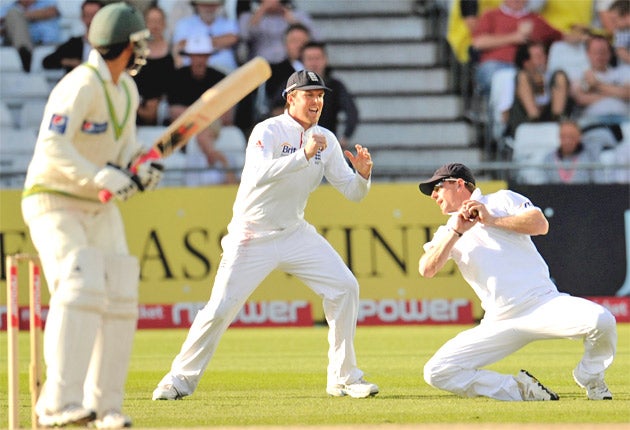Hard work and team spirit: how England became world leaders in the field
The home side barely dropped a chance or gave away a run in the last Test. Stephen Brenkley on how fumble and farce were banished

No truism in cricket has had more lip service paid to it than "catches win matches". Of course, it is usually trotted out when opportunities are spurned, not taken, because the consequences of that can be losing. The phrase has always been a warning more than a rallying cry.
England gave an almost perfect demonstration of what catching and fielding in general really can do at its finest in the first Test against Pakistan in Nottingham. Chances rolled up like rush-hour trains and were snaffled – 10 in the slip cordon, two at the wicket, one at point.
There was, in addition, a run out executed by a classical "dead-eye-dick" throw from Eoin Morgan, who did not rush but made the absolute most of the time at his disposal. England's exhibition looked the more virtuous when compared with their opponents, for whom wicketkeeper Kamran Akmal exemplified why the saying retains its place in all the glossaries from the first over on. The very ball after he had redeemed himself with a spectacular effort to dismiss Kevin Pietersen, he shelled another to spare Paul Collingwood.
This was the sort of stuff that England have been promising to provide for a while. It is two years since they hired the specialist fielding coach, Richard Halsall, and no area of their game has improved so markedly and collectively.
"You need to take 20 wickets in a Test match to win, which is phenomenally hard work," said Halsall. "If you can create 20 chances there's your 20 wickets, but if you have to create 25 chances it makes it much harder. If you were talking about that difference in the business world that would be enormous."
Halsall has allied physical fitness and strength to more sophisticated and precise fielding methods. England's fielders, especially those close to the wicket, are much better balanced now, as if waiting for the ball even when it is flying at them quickly and there is little or no time to react.
"The posture becomes vital," said Halsall. "It goes back to the work which no-one sees in the gym and better posture means the players are more balanced and means they have a better chance of catching the ball using the reflexes and the great hands they have, and because they do so much catching they expect to catch it."
Halsall was initially hired by the former England coach, Peter Moores, who had first used him at Sussex, recognising what fielding could do for the team ethos. There is no doubt either that fielding coaches are here to stay (their influence can be seen in every amateur game now where the sliding stop is as prevalent as in the big time) or that there are still developments to come.
As a club cricketer, Halsall was a mustard keen fielder and as a PE teacher he was trained to watch people, see how they moved and which movement patterns worked and which did not. From there, he began to create fielding drills. He was in Birmingham before the second Test starts tomorrow offering fielding advice to coaches from Warwickshire, where there has been a 35 per cent increase in the number of coaches in response to the Sky Sports coach education scheme.
He could hardly have chosen a more appropriate time considering the standard of England's work at Trent Bridge. All three of the regular slips – Andrew Strauss, Graeme Swann and Collingwood – took sharp chances.
"Colly was outstanding," said Swann. "He took two catches that would have hit me flush on the forehead." Swann probably does himself a disservice considering the speed of his hands but it is true that Collingwood has been deliberately moved to third slip, Halsall preferring him there because third slip has to dive more than second and the Durham man dives better than Swann.
It is not only England's catching but their powerhouse ability round the field, the speed and the accuracy of their throws, with tips taken from baseball. All this has been deliberately targeted by Halsall, dovetailing his work with the strength and conditioning coach, Huw Bevan. Sometimes, the number of England's backroom staff has been derided but here they have brought progress that is plain to see.
The ratio of chances offered and taken has improved significantly and the players work specifically on all three fielding elements, catching, stopping and throwing, because as Halsall said players can be exposed swiftly in a modern game where batsmen can hit the ball to every angle.
"I think we know what the fielding brings, it keeps you very grounded and it's the one thing you can do for someone else," he said. "It's not for you. We want to get as close as possible to those 20 chances for 20 wickets. But it's the nature of sport, it would be very dull if we could guarantee everyone catching everything."
*Pakistan hope to field their veteran batsman, Mohammad Yousuf, in the second Test tomorrow. He has not had an innings since March and does not arrive in England after his weekend call-up until tomorrow, but a team spokesman said yesterday they were confident of his ability to play.
The Sky Sports ECB Coach education programme has trained 23,000 coaches over the past three years. For more information on the scheme please visit www.skysports.com/coaching
Subscribe to Independent Premium to bookmark this article
Want to bookmark your favourite articles and stories to read or reference later? Start your Independent Premium subscription today.

Join our commenting forum
Join thought-provoking conversations, follow other Independent readers and see their replies